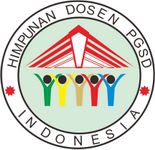Brain Based Learning dalam Perspektif Guru di SD
DOI:
https://doi.org/10.31949/jee.v6i2.5364Abstract
This study aims to present information related to teacher perceptions regarding Brain Based Learning in teaching and learning activities at SDN K2 Karawang Regency which contains the implementation of brain based learning at SDN K2 Karawang Regency. Information was obtained from the results of interviews conducted with ten informants, namely six low class guardians and four high class guardians. The method used in this research is descriptive qualitative research method. The results of this study say that there are still many teachers who do not understand brain based learning so that learning often pays little attention to the concept of brain based learning. The impact experienced or felt by learning students only pursues the fulfillment of completing the subject matter (Target). Constraints experienced by teachers lack of understanding of brain based learning, so that in the learning process they pay less attention to the concept of brain based learning.
Keywords:
brain based learning, perception, learning brain based learninDownloads
References
Ardiyansyah, Wahyuningrum, E., & Rumanta, M. (2022). Pengaruh Problem Based Learning terhadap Kemampuan Penalaran Matematik dan Korelasinya dengan Kemampuan Awal Siswa SMP Mosharafa : Jurnal Pendidikan Matematika Mosharafa : Jurnal Pendidikan Matematika. Mosharafa: Jurnal Pendidikan Matematika, 11(3), 483–494
Azahari, A. R., Sion, H., Kartiwa, W., & Qadariah, A. (2022). Mutu Pengelolaan Program Pendidikan Profesi Guru (PPG) Universitas Palangka Raya. Equity in Education Journal (EEJ), 4(2), 111–117. https://ejournal. upr.ac.id/index.php/eej/article/view/2447/2221
Bruer, J. T. (1999). In Search of… Brain-Based Education. Phi Delta Kappan. V:80, N: 9. (648–654, 656–657) available online http://www.pdkintl.org/kappan/kbru9905.htm from 13.09.2004’
Caine, R. N., Caine, G., McClintic, C., & Klimek, K. (2005). 12 brain/mind learning principles in action: The fieldbook for making connections, teaching, and the human brain. Corwin Press.
Caine, Geoffrey, Renate Nummela Caine. (1994). Making Connections: Teaching and the Human Brain Menlo Park, CA: Addison-Wesley.
Caine, G., Nummela-Caine, R., & Crowell, S. (1999) Mindshifts: A Brain-Based Process for Restructuring Schools and Renewing Education, 2nd edition. Tucson, AZ: Zephyr Press. ISBN: 1569760918.
Caine, G., Caine, R.N., McClintic, C., Klimek, K. (2005). 12 brain/mind learningprinciples in action. Thousand Oaks, CA:Corwin Press.
Given, Barbara K. 2007. Brain-Based Teaching: Merancang Kegiatan Belajar Mengajar yang Melibatkan Otak Emosional,Sosial, Kognitif, Kinestetis, dan Reflektif. Penerbit Kaifa:Bandung.
Hardiman, M., Rinne, L., Gregory, E., & Yarmolinskaya, J. (2012). Neuroethics, neuroeducation, and classroom teaching: Where the brain sciences meet pedagogy. Neuroethics, 5, 135-143,
Helm, J. H., Katz, L. G., & Wilson, R. (2023). Young investigators: The project approach in the early years. Teachers College Press.
Jensen,E. 2008. Pembelajaran Berbasis Kemampuan Otak: Cara Baru dalam Pengajaran dan Pelatihan. Yogyakarta: Pustaka Pelajar.
Kaur, A. (2023). New Science of Teaching and Learning. Notion Press.
Kohar, Dadun. (2022). Measuring the Effectiveness of the Brain-Based Learning Model on the Level of Reading Comprehension Based on Exposition Reading Structures in Junior High School. Educational Sciences: Theory and Practice, 22(1), 78–89. https://doi.org/10.12738/jestp.2022.1.0007
Lestari, K. E. (2014). Implementasi Brain-Based Learning untuk Meningkatkan Kemampuan Koneksi Dan Kemampuan Berpikir Kritis serta Motivasi Belajar Siswa SMP. Jurnal Pendidikan UNSIKA, 2(1), 89–97.
Lidiastuti, A. E., Susilo, H., & Lestari, U. (2020). The development exair based on brain-based learning and whole brain teaching (exair-brain learning) and its effect on learning outcome for senior high school. In Journal of Physics: Conference Series (Vol. 1440, No. 1, p. 012074). IOP Publishing.)
Lombardi. 2004 “Practical Ways Brain Ways Brain-based Research Applies to ESL Learners” dalam The Internet TESL JournalFor Teachers of English as a Second Language, http://http://iteslj.org/yang diakses tanggal 4 Juni 2013.
Marshalsey, L. (2023). Sensory Affect, Learning Spaces, and Design Education: Strategies for Reflective Teaching and Student Engagement in Higher Education. Taylor & Francis.
Permatasari, N. M., & Khotimah, K. (2023). Maksimalisasi Manajemen Kurikulum dalam Meningkatkan Kurikulum di MTs Al-Hikmah Lamongan. Journal on Education, 5(2), 4654-4663.
(Retnoningsih. A. Suharso. (2005). Kamus Besar Bahasa Indonesia, Semarang, Widya Karya
Bimo, Walgito. (2004). Pengantar Psikologi Umum. Yogyakarta: Andi Offset.
Salem, A. A. M. S. (2017). Engaging ESP students with brain-based learning for improved listening skills, vocabulary retention and motivation. English language teaching, 10(12), 182-195. (Bayer, D. Improving Vocabulary Retention for Middle School Learners of English. How can brain-based methods enhance vocabulary learning and acquisition?
hacter, D. L., & Addis, D. R. (2020). Memory and imagination: Perspectives on constructive episodic simulation. The Cambridge handbook of the imagination, 111-131.
Singh, D., & Bashir, H. (2018). Effects of problem based learning and conventional learning on critical thinking ability of higher secondary school students in economics. International Journal of Education and Management Studies, 8(1), 81-86.
Slameto. (2015). Belajar Dan Faktor-Faktor Yang Mempengaruhinya. Jakarta: Rineka Cipta.
Stang, K. (2022). Brain-Based Learning Methods and Student Achievement
Sylwester, R. (1995). A celebration of neurons: An educator’s guide to the human brain. Alexandria, VA: Association for Supervision and Curriculum Development.
Stevens-Smith, D. A. (2016). Active bodies/active brains: The relationship between physical engagement and children's brain development. Physical Educator, 73(4), 719
Stevens-Smith, D. A. (2020). Brain-based teaching: Differentiation in teaching, learning, and motor skills. Journal of Physical Education, Recreation & Dance, 91(7), 34-42
Thoha, M. (2003). Perilaku Organisasi Konsep Dasar Dan Aplikasinya. Pt. Raja Grafindo Persada. Jakarta.
Triyono, & Febriani, R. D. (2018). Persepsi Peserta Didik Sekolah Menengah Atas terhadap Pendidikan Lanjutan. Jurnal Pendidikan dan Pembelajaran, 3(1), 70–77. http://www.ojs.iptpisurakarta.org/index.php/Edudikara/article/view/81]
Uzezi, J., & Jonah, K. (2017). Effectiveness of brain-based learning strategy on students’ academic achievement, attitude, motivation and knowledge retention in electrochemistry. Journal of Education, Society and Behavioural Science, 21(3), 1-13.
Wisudawati, A., & Anggaryani, M. (2014). Penerapan Pembelajaran Fisika Berdasarkan Strategi Brain Based Learning untuk Meningkatkan Keterampilan Berpikir Kritis Siswa pada Materi Elastisitas Kelas XI di SMA Negeri 1 Wonoayu Sidoarjo. Jurnal Inovasi Pendidikan Fisika, 3(2), 1–5.












